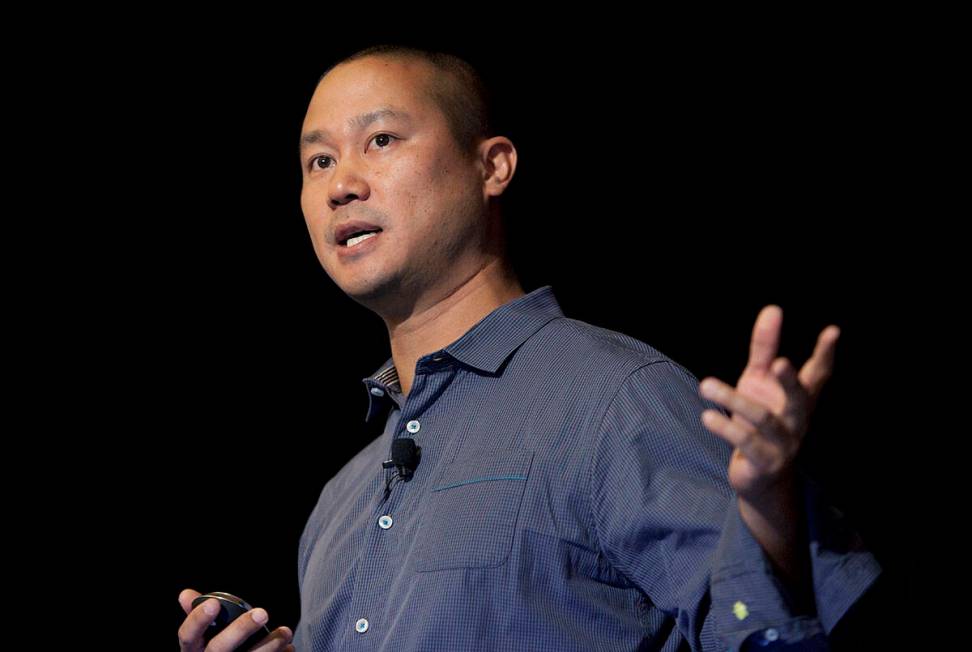Tony Hsieh’s ‘delusion-inspired’ theme park plans detailed in lawsuit

Lawyers for Tony Hsieh’s family have long claimed that the Zappos founder suffered from delusional thinking in the months leading up to his death, but recent court documents have revealed more details of the tech entrepreneur’s plans.
Hsieh wanted to create a theme park, dubbed Country Zero, in Park City, Utah, where visitors would use tarot cards to gain entry to the park and exchange seashells for food, hot air balloon rides and spa days, according to court documents filed Aug. 12 by lawyers representing Hsieh’s estate.
Attorneys filed the counterclaim in response to a lawsuit from Puoy Premsrirut, an attorney for Hsieh who filed a complaint in January seeking legal fees from the estate, court records show. The counterclaim was filed against Premsrirut and more than a dozen additional companies and individuals, who attorneys claim took advantage of Hsieh.
“This litigation arises from the untimely death of Anthony ‘Tony’ Hsieh, and seeks recovery from several individuals, groups, and/or their entities who exploited Tony in his deteriorated, vulnerable condition for their own benefit,” the counterclaim said.
Hsieh died on Nov. 26, 2020, at age 46 from injuries suffered in a Connecticut house fire.
In the final years of his life, Hsieh was malnourished, barely slept and hallucinated from ketamine and nitrous oxide use, his family has said. Hsieh’s erratic behavior described in court filings included “impulsive, poorly planned” or “incoherent” investments into Park City, Utah.
Lengthy court battles have played out since his death over creditor’s claims filed against Hsieh’s estate, including a $40,000 claim for a custom “ceiling brain prototype”; an $8.7 million claim from a Texas-based travel, fitness and wellness company for consulting work; and a transcript of Hsieh hiring someone for $450,000 a year under a loosely defined job title that included working on “random projects like koi fish or tree houses.”
According to the August counterclaim, Hsieh’s line of credit reached $250 million before his death.
His spending included a $2.2 million fixed fee to Premsrirut and her law firm to provide legal services “in furtherance of a delusion-inspired ‘Country Zero’” and a $7.5 million compensation agreement for Hsieh’s friend and financial manager, Tony Lee, for Lee to provide financial consulting services on the theme park, according to the lawsuit.
The counterclaim also alleged that Hsieh acquired the Zappos headquarters building in October 2020 for $70 million, $30 million more than the property’s value.
Hsieh initially planned to sell off some of his Las Vegas holdings to raise money for projects in Park City. But two weeks after initial talks to sell properties, Hsieh instead offered to buy the Zappos building.
“This sudden about-face coincided with Tony’s resignation as CEO from Zappos.com (‘Zappos’) after twenty-one years at the helm,” the counterclaim said. “In purchasing the Zappos HQ acquisition, Tony repeatedly indicated that the central (and irrational) purpose of the proposed transaction was for him to become Zappos’ landlord.”
Other defendants named in the counterclaim were current Zappos landlord Andrew Donner; Tom Kessler and Tom Spiegel, Hsieh’s business partners; and Mark Evensvold, who managed the restaurant Nacho Daddy, of which Hsieh was a part-owner.
Attorneys for Evensvold and Premsrirut did not reply to a request for comment, and attorneys for the other defendants were not listed in court records.
In January, a judge approved a settlement agreement between Hsieh’s estate and his longtime assistant, Jennifer “Mimi” Pham, who was at the center of much of the legal battle over the estate. Pham had filed more than $130 million in creditor’s claims against the estate, but the settlement agreement called for Pham and her boyfriend to instead pay $750,000 to Hsieh’s family.
Contact Katelyn Newberg at knewberg@reviewjournal.com or 702-383-0240. Follow @k_newberg on Twitter.